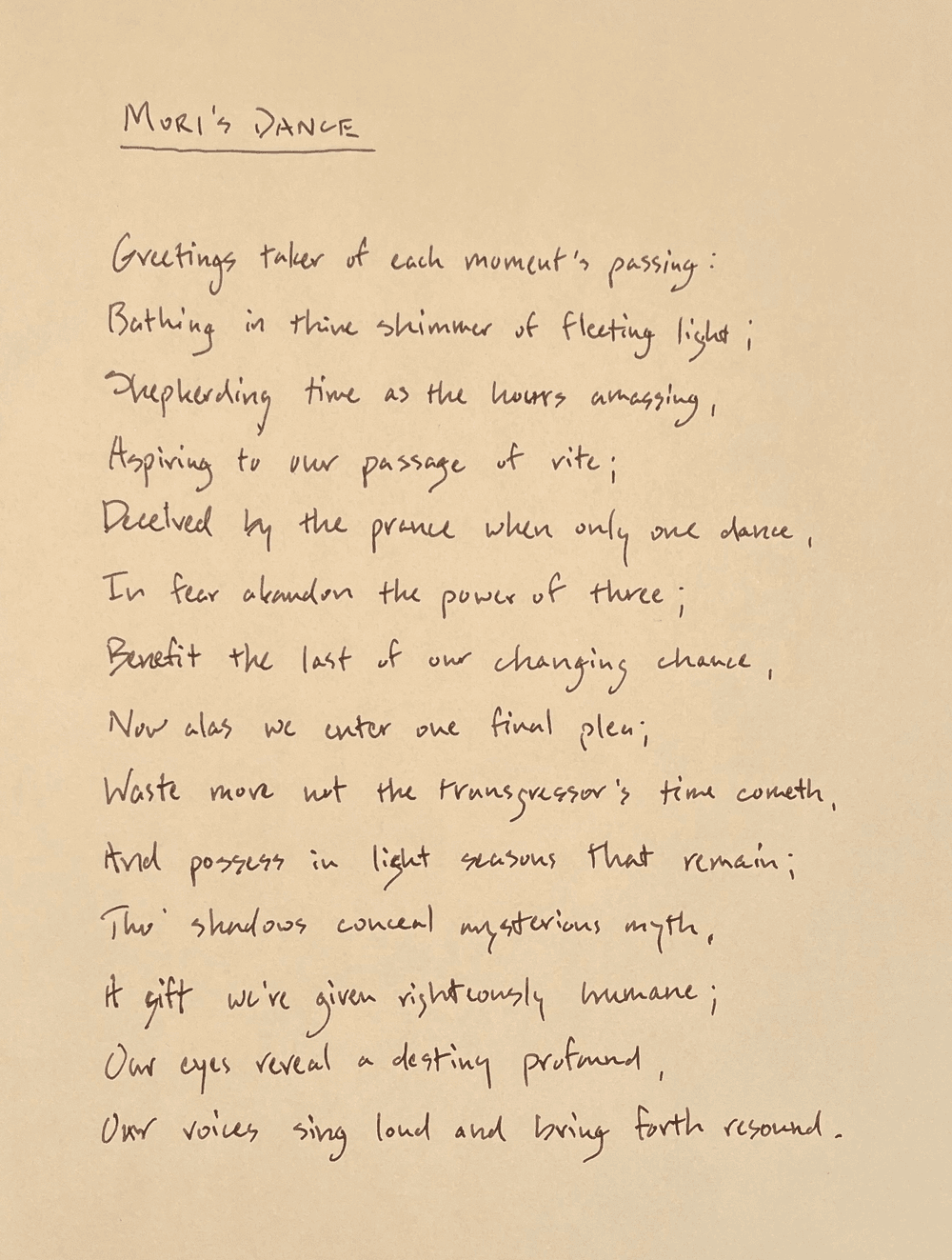

The Poem:
Mori’s Dance
Greetings taker of each moment's passing:
Bathing in thine shimmer of fleeting light;
Shepherding time as the hours amassing,
Aspiring to our passage of rite;
Deceived by the prance when only one dance,
In fear abandon the power of three;
Benefit the last of our changing chance,
Now alas we enter one final plea;
Waste more not the transgressor's time cometh,
And possess in light seasons that remain;
Tho' shadows conceal mysterious myth,
A gift we're given righteously humane;
Our eyes reveal a destiny profound,
Our voices sing loud and bring forth resound.
Structure:
The structure of the poem is a sonnet and is largely based on William Shakespeare's contribution to the form. With 14 lines, each with 10 syllables, this structure consists of three quatrains and one couplet and follows an ABAB CDCD EFEF GG rhyming scheme.
Meaning:
Mori is the Latin word for death. This poem acts as a Memento Mori, which literally translates to, remember you must die. The practical application of Memento Mori is meditating on our own death to gain clarity of the life we want to live.
Background:
Shakespeare is unequivocally one of the great writers on death. He once wrote, "every third thought shall be my grave," which signifies the importance of meditating on one's own death. The ancient Stoics believed that death was not a one time occurrence at some date in the future, but something that is present throughout our lives. Death takes from us each day that passes. We no longer have a grip on that time. It is like sand running between our fingers. We can think on it and learn from it, but we can't relive it. This sort of acceptance of death has the ability to free our ailing mind from the treachery of fear of death because we let go of attempting to control that which is uncontrollable. Although fear never fully goes away, knowledge and acceptance is power because we can view each day we awaken as the gift it is rather than waste it in meaningless and trivial ways. The question isn't whether we are going to die, rather, will we spend our final days regretting how we lived our lives or rejoicing of a life well lived? The key to this question is, we don't exactly know when we are living our final days. Hence the importance of taking measure each day.
Mori's Dance
- 単価米ドル単価数量有効期限送信元
- 単価米ドル単価数量最低価格差有効期限送信元
Mori's Dance

- 単価米ドル単価数量有効期限送信元
- 単価米ドル単価数量最低価格差有効期限送信元
The Poem:
Mori’s Dance
Greetings taker of each moment's passing:
Bathing in thine shimmer of fleeting light;
Shepherding time as the hours amassing,
Aspiring to our passage of rite;
Deceived by the prance when only one dance,
In fear abandon the power of three;
Benefit the last of our changing chance,
Now alas we enter one final plea;
Waste more not the transgressor's time cometh,
And possess in light seasons that remain;
Tho' shadows conceal mysterious myth,
A gift we're given righteously humane;
Our eyes reveal a destiny profound,
Our voices sing loud and bring forth resound.
Structure:
The structure of the poem is a sonnet and is largely based on William Shakespeare's contribution to the form. With 14 lines, each with 10 syllables, this structure consists of three quatrains and one couplet and follows an ABAB CDCD EFEF GG rhyming scheme.
Meaning:
Mori is the Latin word for death. This poem acts as a Memento Mori, which literally translates to, remember you must die. The practical application of Memento Mori is meditating on our own death to gain clarity of the life we want to live.
Background:
Shakespeare is unequivocally one of the great writers on death. He once wrote, "every third thought shall be my grave," which signifies the importance of meditating on one's own death. The ancient Stoics believed that death was not a one time occurrence at some date in the future, but something that is present throughout our lives. Death takes from us each day that passes. We no longer have a grip on that time. It is like sand running between our fingers. We can think on it and learn from it, but we can't relive it. This sort of acceptance of death has the ability to free our ailing mind from the treachery of fear of death because we let go of attempting to control that which is uncontrollable. Although fear never fully goes away, knowledge and acceptance is power because we can view each day we awaken as the gift it is rather than waste it in meaningless and trivial ways. The question isn't whether we are going to die, rather, will we spend our final days regretting how we lived our lives or rejoicing of a life well lived? The key to this question is, we don't exactly know when we are living our final days. Hence the importance of taking measure each day.